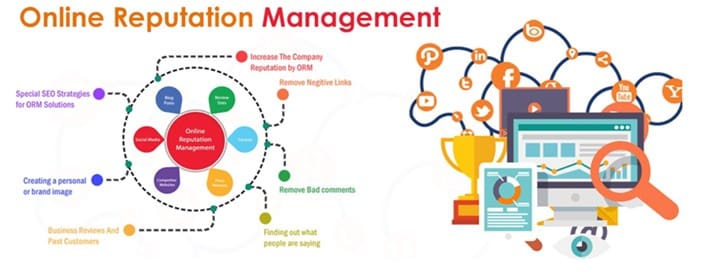From Dilemma to Chance: Leveraging Track Record Administration in Times of Hardship
In today's fast-paced and interconnected globe, people and companies face the continuous risk of crises and hardships that can potentially damage their hard-earned credibility. Nevertheless, amidst the chaos exists a possibility - an opportunity to not only thrive however make it through in the face of misfortune. Reputation management plays a critical function in navigating these difficult times, guaranteeing that the damage is lessened and the potential for development is maximized. In this conversation, we will discover the art of leveraging track record administration throughout times of dilemma, offering understandings and approaches that can change a difficult situation right into a tipping stone for success. Prepare to discover the keys behind turning dilemma right into chance, as we look into study and check out the power of social media sites in shaping online reputation.
Comprehending Online Reputation Management
Understanding credibility administration is vital for people and organizations looking for to keep a favorable public image and mitigate potential damage in times of misfortune. Reputation management includes the tactics and approaches utilized to form, maintain, and secure a person's or organization's online reputation (Reputation Management). It involves actively checking what is being stated about the private or company, both online and offline, and reacting suitably to any kind of unfavorable or damaging details
In today's electronic age, where information spreads rapidly and can have a lasting influence, online reputation monitoring has actually become also more vital. Social media site platforms, on-line review websites, and news outlets can quickly intensify any adverse promotion or objection, potentially causing significant damage to an individual's or organization's track record. By recognizing reputation management, organizations and individuals can effectively browse these obstacles and proactively deal with any kind of concerns that may develop.
Key parts of reputation administration include checking on-line points out and reviews, involving with stakeholders or clients, addressing negative comments or objection in a prompt and professional way, and actively handling on-line accounts and content. Furthermore, individuals and businesses ought to aim to develop a solid credibility by providing on pledges, supplying superb consumer solution, and participating in ethical methods.
Determining Difficulties and Situation Scenarios

To determine these hardships and situation circumstances, organizations require to establish a robust tracking and early caution system. This involves proactively keeping an eye on standard media, social networks platforms, on the internet discussion forums, and other pertinent sources for any kind of negative conversations or possible risks connected to the organization. Reputation Management. By staying alert and proactive, organizations can quickly find and respond to emerging issues, preventing them from spiraling out of control
In addition, organizations must additionally conduct regular threat assessments to determine prospective susceptabilities and weak points in their operations. This allows them to create backup plans and procedures to attend to situations efficiently when they do happen. By being prepared and aggressive in identifying misfortunes and situation scenarios, organizations can better protect their track record, keep stakeholder trust fund, and ultimately turn misfortune right into possibility.
Structure a Situation Response Strategy
Developing an efficient situation response approach is essential for organizations to effectively navigate with difficulty and protect their credibility. In times of crisis, organizations should be prepared to respond rapidly and efficiently to reduce the effect on their stakeholders and preserve public count on. Building a crisis response approach entails numerous crucial actions.
Firstly, organizations need to develop a dilemma monitoring team included essential individuals from various departments. This team should be in charge of establishing and applying the situation action plan. They need to have a clear understanding of the organization's values, purposes, and essential stakeholders.
Second of all, companies must perform a comprehensive threat analysis to determine potential dilemmas that could take place and evaluate their possible effect. This involves examining interior and exterior elements that can result in a situation, such as operational disruptions, economic issues, or reputational dangers.
Following, organizations need to develop an interaction plan that lays out click this site how they will certainly communicate with their stakeholders during a situation. This plan must include clear and constant messaging, in addition to networks and platforms to reach different target markets.
Furthermore, companies should establish methods for monitoring and examining the situation reaction method. This includes routinely examining and upgrading the plan to guarantee its effectiveness and making needed adjustments based on lessons learned from previous dilemmas.

Utilizing Social Media Site in Credibility Monitoring
Social network has actually become an important device for organizations in managing their track record throughout times of hardship. With the rise of social networking systems such as Facebook, Twitter, and Instagram, organizations currently have the opportunity to directly involve with their stakeholders and deal with any kind of concerns or concerns that might develop.
During times of dilemma, social media enables companies to promptly share information, offer updates, and interact their side of the tale. By proactively taking part in social media sites discussions, organizations can keep an eye on public sentiment, address false information, and show openness and liability.
Among the essential advantages of using social networks in online reputation management is the capability to reach a huge target market in real-time - Reputation Management. Through social media platforms, organizations can engage with stakeholders from around the globe, despite geographical borders. This allows them to not just handle their reputation locally however additionally on an international range
An additional advantage of making use of social media sites is the interactive nature of these systems. Organizations can actively listen to their audience, react a knockout post to their worries, and show a readiness to deal with concerns. This degree of engagement aids build trust and integrity, which are crucial for credibility management.
However, it is essential for organizations to approach social media with caution. Errors or improper feedbacks can quickly escalate a crisis and further damage the company's credibility. It is vital for companies to have a distinct social media strategy in location, with clear standards on how to address dilemma circumstances.
Transforming Crisis Into Opportunity: Instance Studies
A number of companies have effectively transformed situations right into opportunities by properly handling their reputation and applying calculated actions. These case researches highlight the value of positive credibility management during times of hardship.
One such instance research is the Tylenol situation in 1982. By focusing on customer safety and security and honestly resolving the situation, Johnson & Johnson not just reclaimed customer trust fund yet additionally established brand-new market requirements for product security.
One more noteworthy example is the Domino's Pizza crisis in 2009. Two employees filmed themselves tampering with food in a Domino's kitchen and uploaded the video clip online. In feedback, Domino's quickly asked forgiveness and released additional hints a thorough online project to deal with the crisis. The company's CEO personally resolved the issue in a YouTube video clip, showing transparency and dedication to customer complete satisfaction. This positive approach aided Domino's gain back customer trust fund and even boost sales complying with the event.
These study show the value of swift activity, transparency, and reliable communication consequently dilemmas into chances. By efficiently handling their credibility and applying tactical activities, companies can not only minimize the negative effects of a crisis however additionally emerge more powerful and more durable.
Verdict
In times of hardship, credibility monitoring plays an essential function in organizations' survival and success. By comprehending the relevance of reputation administration, determining situation scenarios, and structure reliable feedback approaches, companies can effectively navigate with tough times. Leveraging social networks as a device in track record monitoring can additionally boost companies' capability to deal with dilemmas and communicate with stakeholders. Through proactive and tactical reputation management, situations can be developed into possibilities for development and enhancement.
By being prepared and positive in determining hardships and situation circumstances, organizations can much better safeguard their reputation, keep stakeholder depend on, and ultimately transform hardship into chance.
Developing a reliable crisis feedback technique is important for organizations to efficiently navigate via hardship and shield their track record. Missteps or improper responses can swiftly rise a dilemma and further damage the organization's online reputation. Leveraging social media as a device in reputation administration can better enhance organizations' ability to deal with situations and communicate with stakeholders. With tactical and positive online reputation administration, situations can be transformed into chances for development and renovation.